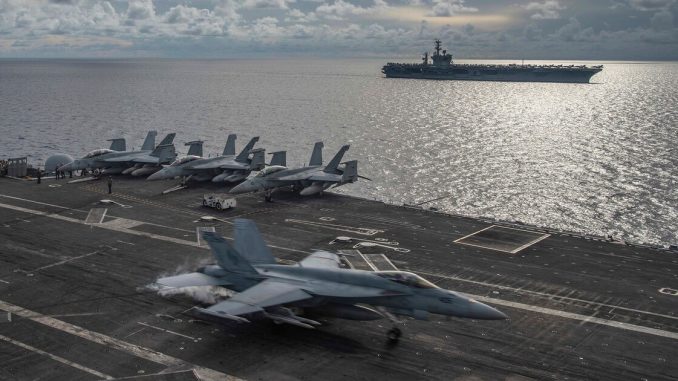
WASHINGTON — Activity by the U.S. Navy in its campaign to challenge China’s efforts to restrict transit in the South China Sea and in the Taiwan Strait increased sharply over the past two years.
According to U.S. Navy data, war ships maneuvered close to artificial islands claimed and developed by China 10 times in 2019 and another 10 times last year, at least double the annual number going back to 2014. And Navy ships sailed through the Taiwan Strait 13 times in 2020, the highest number of transits in at least 14 years.
The increase in naval activity reflected the strident Trump administration views on China and the Pentagon’s escalating efforts to counter Beijing’s ongoing military expansion, which the U.S. believes is eroding its competitive edge. The naval transits also are one of the more visible ways that the U.S. military can confront Chinese claims without any actual conflict.
But the heightened pace of U.S. ship operations in that region of the Pacific under President Donald Trump raises questions about what the Biden administration will do, as it looks to increase engagement with Pacific nations to offset China’s growing influence. Two of Biden’s senior Cabinet members, Defense Secretary Lloyd Austin and Secretary of State Antony Blinken, are in Asia this week, working to cement relations with allies.
China claims ownership over virtually the entire South China Sea and has built military installations on reefs and atolls by covering them with sand and concrete. In recent years, Beijing has deployed anti-ship missiles, surface-to-air missiles, electronic jammers and other equipment on the Spratly Islands, and landed a bomber aircraft on other outposts.
To erode China’s claims on the South China Sea, U.S. ship conduct “freedom of navigation” operations, sailing into international waters that China is trying to claim as its own. So far this year, there have been two such operations in the South China Sea, the latest one on Feb. 17, around the Spratly Islands.
In fact, a large number of the missions over the last two years involved either the Spratly or Paracel Islands, where China has developed outposts.
“Unlawful and sweeping maritime claims in the South China Sea pose a serious threat to the freedom of the sea, including freedoms of navigation and overflight, free trade and unimpeded commerce, and freedom of economic opportunity for South China Sea littoral nations,” the U.S. Navy’s 7th Fleet said last month, when the USS Russell, a destroyer, sailed around the Spratly Islands.
In addition, China bristles at America’s longstanding ties with Taiwan, the island democracy claimed by Beijing as its own territory. The U.S. ship transits through the Taiwan Strait, which divides China and Taiwan, are viewed by Beijing as provocative.
The number of transits was about a dozen in each of the last two years of the Obama presidency, as the U.S. shifted its attention to Asia after years of focusing on the wars in the Middle East. In Trump’s first two years there were only a few operations through the Taiwan Strait, but they increased to nine in 2019 and 13 in 2020.
So far this year, there already have been two, including one last Wednesday by the guided missile destroyer USS John Finn.


Be the first to comment